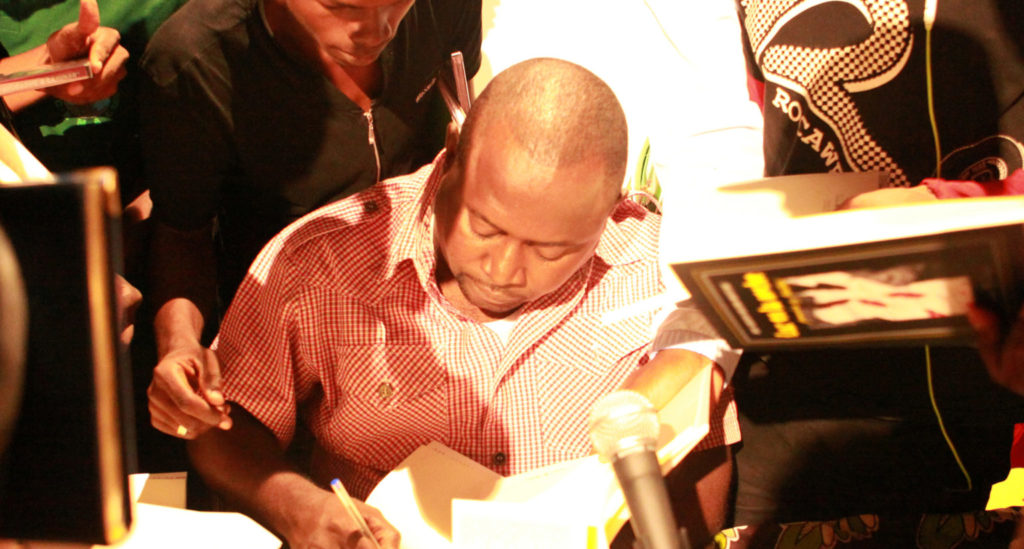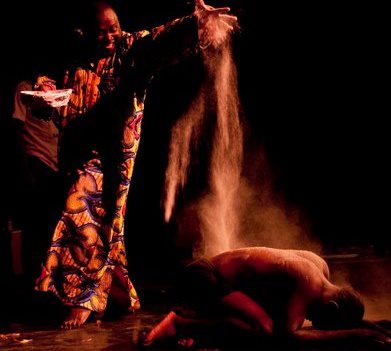
Rootencial is delighted to introduce Recaredo Silebó Boturu, otherwise known as ‘Boturu.’ He is the director of the Bocamandja theatre group, which has become the greatest exponent of Equatorial Guinean theatre, drawing upon different types of art including poetry and drama.

Born in the town of Baresó, located 24 kilometers from Malabo, the capital of Equatorial Guinea, Boturu emphasizes that although his roots are in this former Spanish colony, he defines himself above all else as a citizen of the world. He is dedicated to breaking down the barriers that limit human beings in their development.
Boturu tells Rootencial about his childhood and adolescence. Raised in Baresó, he waved goodbye to his mother and left his hometown before his twelfth birthday, moving to Malabo where he was hosted by his father’s family and continued his studies. It was in Malabo that Boturu’s passion for art and culture flourished; he says that it was through Liki Loribo – a writer, playwright and director of traditional dance and theatre groups – that he discovered the art scene of the 1990s. When Liki moved abroad, he left the dance and theatre group in Boturu’s hands, who successfully managed to take it forward, receiving great acclaim and a series of national awards.
Equatorial Guinea did not have the necessary means to promote art but, even so, the vitality of the city and the contact with the Hispano-Guinean Cultural Centre allowed me to meet between 100 and 150 young people who cared about the same social issues in this world as me.
During his adolescence, Boturu’s fascination for Equatorial Guinea’s artistic world only increased, eventually leading him to help organise theatrical workshops and trainings to work with other young people with a shared interested in culture. Through the Hispano-Guinean Cultural Centre, he met writers such as Juan Tomás Ávila Laurel and Donato Ndongo, through whom he discovered a new cultural passion – literature.a
Many young Equatorial Guineans are skeptical and doubt the ability of their country to develop young artists, Boturu says. However, undeterred by this, Boturu nevertheless advises young people to excel and obtain training in the thing they are passionate about. There are, he says, different types of young artists, however: those that have the ‘good nose’ to take advantage of opportunities to get out of the difficult circumstances they are in, on the one hand, and those that don’t have this ‘good nose’ on the other. For the latter group of artists, Boturu underscores the importance of surrounding themselves with people with the same aspirations but who can help them find opportunities, or that can put them in touch with influential people in the field they are interested in.
He recognises that the challenges artists face get harder and harder; to overcome these, artists must receive the necessary training to ensure their work is stable and pays enough. Yet, Boturu is clear that this does not require giving up on your dreams or motivations. Boturu says that he is most proud of the growth of Bocamandja, which is now expanding on both the national and international level, as well as the support he has received in his different artistic productions, and the involvement of artists who managed to reconcile their professional and artistic lives and show that acting is not about “messing around.” He reminds us that challenges will always be there, but that the most important thing is to accept this fact and be prepared to cope with the difficulties:
[In difficult times] we shouldn’t wake up expecting the sun will appear. Instead, we should bring an umbrella in case it rains, or know where to find one so we don’t get wet and can keep going
Boturu’s dedication to culture has left a mark. In 2016, he was recognised as one of the best African writers under 40. Through the creation of the Bocamandja community, his work has reached audiences in Europe, Latin America and Africa, reflecting his courage and conviction that diversity helps people to get out of the “I” and find personal enrichment by experiencing other cultures, taking from the best of each to advance their personal and professional development.
Boturu encourages us to discover how immense and diverse this world is, and how, through culture, we can fight inequalities and contribute positively to our society.
Comments are closed.